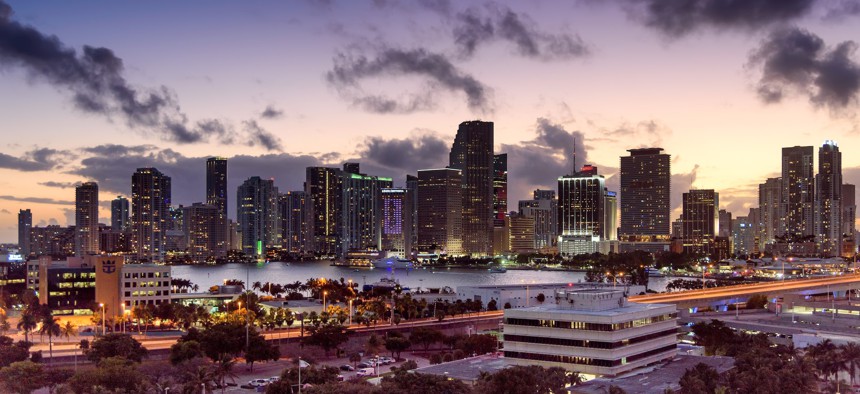Personality
The legal woes of Miami's elected officials continue to mount
The city's leaders are embroiled in a cavalcade of legal crises.

Photo by Joe deSousa on Unsplash
With the recent arrest and suspension from office of Miami City Commissioner Alex Díaz de la Portilla for felony charges including money laundering, Miami leaders are embroiled in a cavalcade of legal crises.
In the past four months, three of Miami’s elected officials on the five-member commission have been either charged with criminal activity, put under federal investigation or faced major financial liability from a legal suit.
The totality of the legal issues has created an unstable atmosphere around Miami City Hall, with officials getting into tense confrontations with reporters asking questions.
Alex Díaz de la Portilla
Díaz de la Portilla was arrested September 14 and charged with a series of felonies following an investigation by the Broward State Attorney’s Office and the Miami-Dade Commission on Ethics.
Díaz de la Portilla and his co-conspirator, lobbyist William Riley Jr., face the following charges:
- Money laundering
- Unlawful compensation or reward for official behavior
- Bribery
- Criminal conspiracy
Díaz de la Portilla himself was charged with a felony count of official misconduct as well as a misdemeanor campaign finance violation and a misdemeanor for failing to report a gift.
Speaking to TV reporters, Díaz de la Portilla called the charges a “work of fiction” and denied the allegations against him. Nevertheless, Gov. Ron DeSantis suspended the commissioner from office on September 15, the day after his arrest.
The remaining Miami commissioners have until September 25 to either appoint a replacement for their suspended colleague, or to call for a special election.
Francis Suarez
Miami Mayor Francis Suarez is embroiled in a criminal investigation of developer Rishi Kapoor, according to the Miami Herald.
The FBI is investigating Kapoor and his former company, Location Ventures, following reports that the real estate firm was making payments to Suarez to get over permitting hurdles in the city. The FBI’s public corruption unit is reportedly looking into whether these payments constitute a bribe.
Kapoor has since resigned as CEO of Location Ventures.
Both Suarez and Kapoor deny any wrongdoing.
Suarez is also the subject of a complaint to the Florida Commission on Ethics for accepting tickets to high-priced sporting events — including multi-thousand dollar tickets to the Miami Grand Prix provided by hedge fund executive Ken Griffin.
Ethics rules prohibit elected officials from accepting gifts from people who have business before the city. Citadel, Griffin’s company, employs lobbyists that are registered with the City of Miami.
Approached by Miami Herald reporters on September 9, Suarez got into a physical confrontation in which he grabbed the cell phone of a reporter who was recording him outside his office at city hall — which is public property.
Suarez eventually told reporters that he paid back Griffin for the value of the tickets, and acted in an ethical manner. He has until September 30 to report any gifts greater than $100.
Joe Carollo
A federal jury in June found Miami commissioner Joe Carollo liable for violating the First Amendment rights of Little Havana property owners William Fuller and Martin Pinilla.
The men sued Carollo in federal civil court in 2018 for launching what they called a “campaign of harassment” against businesses they were involved with, including the Ball & Chain bar located on Calle Ocho.
After months of trial, the jury sided with Fuller and Pinilla and ordered Carollo to pay $63.5 million in damages to the pair. The commissioner is currently appealing that decision.
Gerrymandering lawsuit
Moreover, the city itself is facing a pending trial in federal court for alleged racial gerrymandering.
A collection of local activist groups represented by the ACLU of Florida sued the city over its voting district maps, which were redrawn after the 2020 census.
The groups claimed that the maps split Miami voters based on their race and ethnicity, essentially creating a Black district, a white district, and three Hispanic districts.
Though the groups’ effort to invalidate the city’s map before the November election failed on appeal in the U.S. Supreme Court, the case is still scheduled to go to a jury trial in 2024.
This story is published as part of a collaboration between City & State Florida and WLRN News. Joshua Ceballos is WLRN's Local Government Accountability Reporter and a member of the investigations team. Reach him at jceballos@wlrnnews.org and follow him on X: @joshceb
NEXT STORY: Read Florida House Speaker-designate Daniel Perez's acceptance speech
